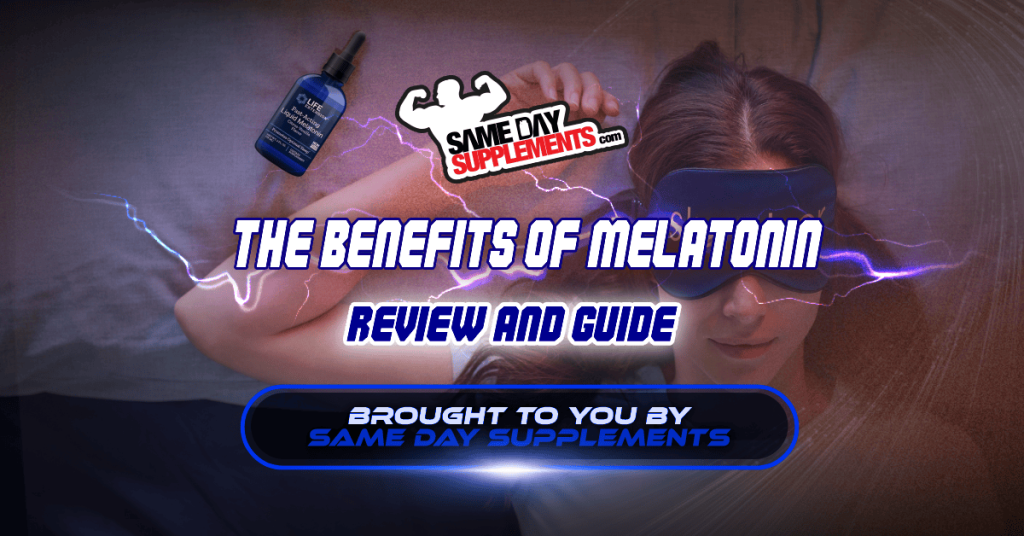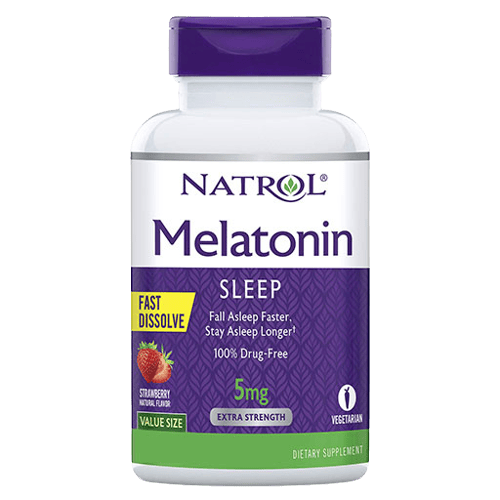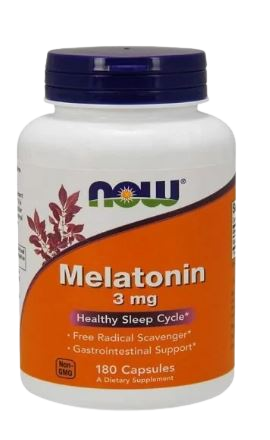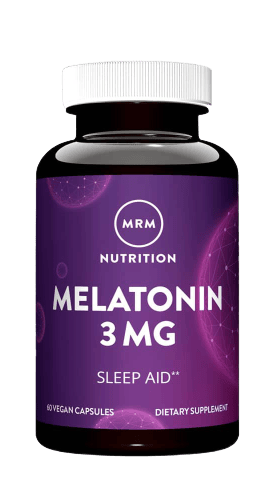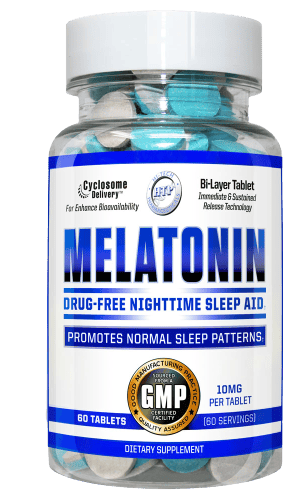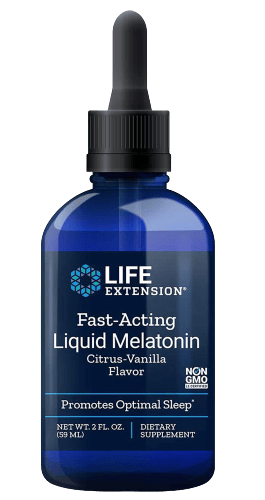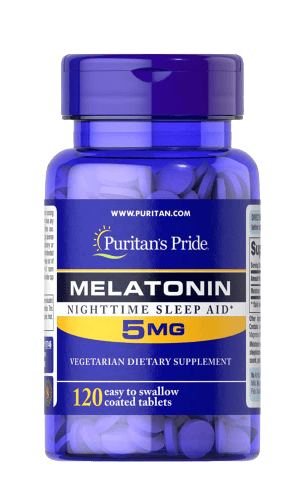The Benefits Of Melatonin For Your Sleep And Health 2023 (Guide)
What Is Melatonin | How It Works | Who Should Take It | Health Benefits | Comparisons | Popular Products | FAQ | Warnings And Side Effects | Disclaimer
Sleep is crucial to our well-being, and many struggle to get enough sleep each night, which can, unfortunately, lead to various health problems, including mood disorders, weight gain, and an increased risk of chronic illnesses such as diabetes and heart disease. Melatonin, a hormone naturally produced by the body, is vital in regulating sleep-wake cycles. In addition to its role in sleep, melatonin may have various other health benefits. In this guide, we’ll explore how it works, its potential benefits, and popular products available today. Whether you’re struggling with insomnia, looking to improve your sleep quality, or simply curious about the benefits of melatonin, this guide has something for you.
![]()
What Is Melatonin?
Melatonin (N-acetyl-5-methoxytryptamine) is a hormone thought to be produced by the pineal gland in the brain. However, we now know that it can also be produced in several other organs and tissues in the body. These include the retina, harderian glands (which are connected to the lacrimal glands), bone marrow, skin, and cells in the gastrointestinal tract that produce serotonin, cerebellum, and immune system. Even so, it’s most commonly known for regulating the sleep-wake cycle, also known as the circadian rhythm.(1,2,3,4,5,6,7)
As a supplement, it’s often the first choice to address sleep issues and jet lag, but it may also have other potential health benefits. Besides being a sleep aid, melatonin may help control the timing and release of female reproductive hormones and may be related to aging. Additionally, this powerful hormone also has strong antioxidant effects and anti-inflammatory effects, which research suggests may help strengthen the immune system. (1,2,3,4,5,6,7)
![]()
How Does It Work:
Melatonin supplements work by increasing the melatonin levels in the body, which helps regulate the sleep-wake cycle. When taken orally, it is absorbed into the bloodstream and travels to the brain. Here, it binds to receptors that control the circadian rhythm. This process helps to promote sleep and improve overall sleep quality. (3,4,6)

While darkness can trigger the release of melatonin in our bodies, the hormone itself is made from serotonin using 5-hydroxytryptophan (5-HTP) and tryptophan. Tryptophan can be broken down into different pathways, including one that leads to melatonin production and another that produces nicotinamide adenine dinucleotide (NAD+) for cellular energy. Outside of supplementation, we can naturally increase the production of serotonin and melatonin through healthy behaviors like exercise. However, when we’re under stress or have inflammation, tryptophan can be broken down more and produces a substance called kynurenine, which is linked to depression. (6,7)
The effectiveness of melatonin supplements can vary depending on factors such as dosage, timing of administration, and individual differences in metabolism. For example, taking melatonin supplements at the right time, such as 45-60 minutes before bedtime, may improve its effectiveness in promoting sleep. Additionally, some studies suggest that higher doses of melatonin may be more effective in treating sleep disorders such as insomnia. (5)
Another factor to consider with supplements is the form of release (immediate or delayed). Immediate-release melatonin can be rapidly metabolized and eliminated in 3-4 hours, whereas delayed-release melatonin can maintain a stable level of melatonin in your body for 8-10 hours, allowing you to sleep more naturally. (7)
![]()
Who Should Take It:
Melatonin supplements are generally safe for most people when taken in recommended dosages for short periods. People who may benefit from taking these supplements include those who have trouble falling asleep or staying asleep, such as individuals with insomnia or jet lag. Melatonin supplements may also be helpful for people who work night shifts or have sleep disorders.†
However, these supplements may not be suitable for everyone. If you are pregnant, breastfeeding, or trying to conceive, you should avoid using melatonin supplements, as their effects on fetal and child development are poorly understood. Additionally, people with certain medical conditions, such as depression, diabetes, or autoimmune disorders, should use melatonin supplements with caution and under the guidance of a healthcare provider, as they can interact with certain medications and may exacerbate certain health conditions.†
![]()
Health Benefits:
Melatonin supplements may have several potential health benefits, but more research is needed to understand their effects on overall health fully. Here are some of the potential health benefits of melatonin supplements:
Improve Sleep:
Melatonin can help regulate our body’s internal clock, or circadian rhythm, which is mostly influenced by exposure to light. When taken at certain times, melatonin can cause a shift in the body clock, making us sleepy or awake earlier or later. This can be helpful for people with sleep-wake disorders, such as those who work night shifts or have trouble falling asleep and waking up. Studies suggest that melatonin can also improve sleep efficiency and reduce subjective complaints. Additionally, taking melatonin at the right time can help people recover from jet lag. (3,4,5,6)
Brain Health And Protection:
Recent studies show that melatonin may protect the brain from damage due to stroke and preterm birth. In fact, animal studies suggest melatonin can reduce brain damage, inflammation, and blood-brain barrier problems. It also may improve motor function and reduce anxiety. Current research on melatonin is testing its use to prevent brain damage in preterm babies and to treat neurodegenerative diseases like Alzheimer’s. (3,4,5,6)
Weight And Metabolism:
Melatonin also plays a role in regulating energy metabolism in the body. This includes functions like body weight, insulin sensitivity, and glucose tolerance. In fact, studies suggest melatonin replacement therapy may reverse glucose intolerance and peripheral and central insulin resistance and improve body weight, fat mass, and lean mass. Similarly, in a randomized placebo-controlled study, daily administration of melatonin to postmenopausal women resulted in a decrease in fat mass and an increase in lean mass. (5,6)
Heart Health:
Melatonin can also support our blood pressure, heart rate, and blood vessels in different ways. It can act directly on different parts of our cardiovascular system, like the heart and blood vessels, or through receptors in our brain to regulate our blood pressure. It also helps to protect our cardiovascular system by acting as an antioxidant and regulating mitochondrial function. (5,6)
Migraines:
Studies suggest migraines may be linked to problems with gut bacteria and lower levels of melatonin in the gut. However, they can also be connected to other health conditions, such as thyroid problems or autoimmune disorders, that cause melatonin regulation failure. Fortunately, studies indicate that supplementation can effectively treat migraines. In fact, one study’s results found that taking 3 mg of melatonin was just as effective as a medication called amitriptyline in reducing the number of migraines. Similarly, another study suggests that taking it for 30 days improved sleep quality and reduced pain and tension headaches in people with chronic headaches. (6)
Polycystic Ovarian Syndrome (PCOS):
Polycystic Ovarian Syndrome (PCOS) is a health condition that affects 5-10% of women. It can cause various symptoms, such as increased hair growth, acne, weight gain, poor sleep, and problems with menstruation and fertility. Women with PCOS often have altered melatonin levels and circadian patterns. Studies suggest that melatonin can improve hormone levels, menstrual regularity, and sleep quality in women with PCOS. (6)
It’s important to note that the potential health benefits of melatonin supplements vary depending on factors such as the dosage, timing of administration, and individual differences in metabolism.
![]()
Melatonin Comparison:
When it comes to sleep aids, there are a variety of natural supplements on the market. This section will compare melatonin to magnesium, Unisom, Zzzquil, ashwagandha, and valerian root.
Firstly, let’s take a look at melatonin versus magnesium. While both are often used as sleep aids, they have different mechanisms of action. Melatonin helps regulate the body’s internal clock and promote natural sleep patterns, while magnesium helps relax the muscles and calm the mind. So, if you have trouble falling asleep due to muscle tension or a racing mind, magnesium may be a better choice.†
Next up is melatonin versus Unisom. Unisom contains an antihistamine called doxylamine succinate, which can cause drowsiness and help you fall asleep. However, it can also cause side effects such as dry mouth and dizziness. Conversely, melatonin is a natural hormone that is less likely to cause side effects and is generally considered safer. (8)
Similarly to Unisom, Zzzquil contains the active ingredient diphenhydramine. Like Unisom, diphenhydramine is an antihistamine that can cause drowsiness. Still, it can also cause side effects such as dizziness and confusion. Melatonin is once again a natural and safer option. (8)
Ashwagandha is an adaptogenic herb with traditional uses to reduce stress and anxiety, making it a popular choice to promote relaxation and improve sleep quality. However, unlike melatonin, ashwagandha does not directly regulate the sleep-wake cycle. Instead, it helps regulate the body’s response to stress, which can help reduce anxiety and promote relaxation.†
Finally, let’s compare melatonin to valerian root. Valerian root is an herb that may promote relaxation and relieve anxiety. Like ashwagandha, it works by increasing the levels of GABA in the brain, which can help reduce stress and promote relaxation. While valerian root and melatonin can effectively promote relaxation and improve sleep quality, they work differently.†
In conclusion, many natural supplements can help promote relaxation and improve sleep quality. While melatonin is a popular and effective option, it’s important to consider your needs and health status before choosing a sleep aid. Always talk to your healthcare provider before starting any new supplements, and consider trying different options to find the one that works best for you.
![]()
Popular Products:
Now that we’ve discussed the benefits and comparisons of melatonin to other sleep aids, let’s take a closer look at some of the most popular melatonin supplements available today.
Natrol Melatonin is a popular brand of melatonin in America that helps with occasional sleeplessness by helping you fall asleep faster, stay asleep longer, and wake up feeling refreshed. It’s a drug-free sleep aid that dissolves quickly in the mouth without water. It comes in a tasty strawberry flavor and other natural flavors and is 100% vegetarian. The ingredients are clean, as Natrol Fast Dissolve Melatonin is non-GMO, free of artificial flavors, sweeteners, preservatives, and synthetic dyes. It’s available in fast-dissolve tablets in 250-count.†
Also available as gummies!
How To Take Natrol Melatonin:
The manufacturer recommends taking one (1) tablet 20 minutes before bedtime.
Customer Review By Beth: “I have been using Natrol Melatonin 5 mg for a while now, and it’s been a game-changer for my sleep routine. The strawberry flavor is a nice touch and makes it easy to take. I love that it’s a natural and non-habit-forming way to help me fall asleep faster and stay asleep longer. Highly recommend it to anyone looking for a better night’s sleep!’
NOW Foods offers melatonin in different sizes and forms to suit your needs. You can choose from 1mg tablets in a 100-tab count, 3mg capsules or lozenges in a variety of counts, liquid form in a two fl oz bottle, 5mg capsules in 60-count or 180-count, a 5mg sustained release tablet in a 120-count bottle that slowly releases melatonin over 4 hours, 10mg capsules in a 100-count bottle, and 20mg capsules in a 90-count bottle.†
How To Take NOW Melatonin:
The manufacturer recommends the following directions depending on the mg/form:
- Tablets: Take one (1) tablet about 1 hour before bedtime with juice or water.
- Liquid: Shake well. Take 1/4 teaspoon (~20 drops) just before bedtime. Take directly or add to your favorite beverage.
- Lozenges: Take one (1) lozenge before bedtime as needed. Chew the lozenge or hold it in your mouth until dissolved and swallow.
- Veg Capsules: Take one (1) capsule near bedtime with water.
- Sustained Release: Take one (1) tablet daily near bedtime with water.
- Extra Strength: Take one (1) capsule near bedtime with water.
Customer Review By Bella: “I’ve noticed a significant improvement in my sleep quality since starting to use this product. Highly recommend!”
MRM Melatonin capsules contain 3 mg of melatonin and come in a bottle of 60 vegan capsules.
How To Take MRM Melatonin:
The manufacturer recommends taking one (1) capsule daily before bed or as directed by your qualified healthcare provider.
Customer Review By Brooklyn: “I’ve been taking MRM Melatonin for a few weeks now, and it has made a noticeable difference in the quality of my sleep. I fall asleep faster, stay asleep longer, and wake up feeling refreshed. The 3mg dose is perfect for me, and it comes in vegetarian capsules is a big plus. I highly recommend this to anyone looking for a natural sleep aid!”
Hi-Tech Pharmaceuticals Melatonin has a unique approach to solving the issue of melatonin absorption with their patent Cyclosome™ delivery. This technology helps it absorb more readily into the gut and maintain consistent levels each night, allowing the body to regulate its sleep patterns better.†
Moreover, Hi-Tech’s Melatonin offers a multi-stage delivery method. In the first stage, 3mg of melatonin is rapidly released into the bloodstream to induce the first stage of sleep. Then, 7mg is released to achieve a deeper sleep.†
How To Take Hi-Tech Pharmaceuticals Melatonin:
The manufacturer recommends taking one (1) tablet 20 minutes before bedtime.
Customer Review By Chris: “I struggled to get a full night’s sleep for years until I discovered this melatonin supplement. It kicks in quickly and helps me fall asleep faster than ever before. Plus, it keeps me asleep all night without grogginess in the morning. I’ve tried other melatonin products in the past, but this one is truly a game-changer. Highly recommended for anyone who struggles with sleep!”
Life Extension Fast-Acting Liquid Melatonin is a sleep support supplement that contains 3 mg of melatonin in a delicious citrus-vanilla flavor. This liquid formula is designed to be quickly absorbed, promoting healthy sleep faster.†
Also available as a gummy:
How To Take Life Extension Liquid Melatonin:
The manufacturer recommends taking one (1) mL 30 to 60 minutes before bedtime or as a healthcare practitioner recommends. 1 mL is equivalent to approximately 20 drops.
Customer Review By Anna: “I never realized how much of a difference melatonin could make until I started using this consistently. Now, I can’t imagine going without it.”
Puritan’s Pride offers a variety of sizes and forms of melatonin to cater to different needs. For those who prefer a lower dosage, there is the 300mcg option available in 30 tabs or the 1mg option available in 90 tabs. Or for those who enjoy a fruity flavor, there is the 2.5mg Strawberry Gummies, and for those who prefer a quick-dissolving option, there are the 3mg 12-count tabs or the 10mg Cherry or Strawberry Quick Dissolve Melatonin in 90 Tabs.†
For those who want a sustained release of melatonin, there are the Bi-Layered Melatonin 5mg tablets or the Timed Release Melatonin w/B6 5mg tablets available in 60 and 120 ETS tablets, respectively. Finally, the 10mg Black Cherry liquid is available in a two-fl oz bottle for those who prefer liquid options.†
How To Take Puritan’s Pride Melatonin:
The manufacturer recommends taking one (1) tablet/capsule at bedtime.
Customer Review By Linda: “I’ve been using Puritan’s Pride Melatonin for a couple of months now, and it has greatly improved my sleep. I love how it’s easy to swallow and doesn’t leave any aftertaste. I wake up feeling refreshed and energized for the day ahead. Highly recommend!”
![]()
Melatonin FAQ:
In this section, we’ll address some common questions related to Melatonin and its uses.
Are Melatonin Gummies Effective? |
|---|
| Yes, melatonin gummies can effectively promote relaxation and improve sleep quality. However, the effectiveness can vary depending on several factors, such as individual response, dosage, and timing.†
Melatonin gummies typically come in dosages ranging from 1-10 mg per gummy. It’s important to follow the recommended dosage on the label and start with the lowest effective dose. Taking too much melatonin can lead to grogginess, dizziness, and other side effects.† Timing is also an important factor to consider. Melatonin supplements should be taken 30-60 minutes before bedtime to allow the body time to absorb and utilize the hormone. Taking melatonin too early or too late can reduce its effectiveness.† |
Can Melatonin Cause Nightmares? |
| While melatonin is generally considered safe and well-tolerated, some people can experience nightmares or vivid dreams when taking melatonin supplements. The exact mechanism behind this phenomenon is not fully understood. Still, it’s thought that melatonin may affect the REM (rapid eye movement) stage of sleep, which is when most dreaming occurs. This can lead to more vivid dreams. (4,9)
However, it’s important to note that nightmares and vivid dreams are not common side effects of melatonin, and most people who take the supplement do not experience these effects. If you do experience nightmares or vivid dreams when taking melatonin, it’s possible that a lower dosage or a different timing may help. It’s always best to consult your healthcare provider before changing your supplement regimen.† |
Will It Cause Weight Gain? |
| There is no evidence to suggest that melatonin causes weight gain. In fact, some studies suggest that it may benefit weight management. Melatonin is a hormone that regulates the sleep-wake cycle and is involved in other physiological processes, such as metabolism and appetite regulation. Some studies even indicate it may increase brown fat, which is a type of fat that helps to burn calories and regulate body weight. Additionally, melatonin may have an inhibitory effect on obesity and metabolic disorders in animal studies. While more research is needed to fully understand the role of melatonin in weight management in humans, the current evidence suggests that melatonin is unlikely to cause weight gain and may even positively affect body weight. (5,6) |
Melatonin And Alcohol |
| While there are no known direct interactions between melatonin and alcohol, it’s generally recommended to avoid alcohol consumption when taking any sleep aids, including melatonin. This is because alcohol can interfere with the body’s natural melatonin production and disrupt the sleep-wake cycle. Additionally, alcohol can increase the side effects of melatonin, such as drowsiness, dizziness, and impaired coordination, which can be dangerous if you need to perform any tasks that require alertness.† |
Benadryl And Melatonin |
| Benadryl (diphenhydramine) is an antihistamine often used to treat allergy symptoms and as a sleep aid, whereas melatonin is a hormone that regulates the sleep-wake cycle. While both Benadryl and melatonin can promote drowsiness and improve sleep quality, they work through different mechanisms and can have different side effects and interactions. Taking Benadryl and melatonin together is generally not recommended without consulting a healthcare provider. This is because they can interact and increase the side effects of each other, such as dizziness, drowsiness, and impaired coordination. In addition, long-term use of Benadryl as a sleep aid is not recommended due to the potential for side effects such as daytime drowsiness, cognitive impairment, and an increased risk of falls and accidents in older adults. (8) |
What Are The Side Effects? |
| Melatonin is generally considered safe and well-tolerated when used appropriately and for short-term use. However, like any supplement or medication, it can have potential side effects, especially if taken in high doses or for long periods of time. (4,9)
Some common side effects of melatonin may include (4,9):
It’s important to note that melatonin can also interact with certain medications, such as blood thinners, anticoagulants, and immunosuppressants. If you are taking any medications, talking to your healthcare provider before taking melatonin is important to avoid potential interactions or adverse effects. |
Wrapping Up!
And this marks the end of our post on Melatonin. Thank you for reading! And as always, if there was something that wasn’t clear, another question you might have, or if you have another idea for a blog, Email Us!
Are you looking for more to read? Check out some of our other blogs!
![]()
Warnings And Side Effects:
For adults only. It may cause drowsiness. Do not operate a vehicle or heavy machinery following the consumption of melatonin. Consult physician if pregnant/nursing, taking medication (especially sedatives, immunosuppressants, or anticoagulants), or have a medical condition (including diabetes, auto-immune conditions, depressive disorders, cardiovascular conditions, and epilepsy). Keep out of reach of children.
Do not eat freshness packet. Keep in the bottle.
![]()
Disclaimer:
†Please note the intention of the information provided is for reference only. Furthermore, we are in no way providing medical advice or instruction. Instead, the information provided in this guide/blog utilizes anecdotal information and available studies/reviews. While we aim to maintain and display accurate information, we can’t guarantee it represents the latest product formulation or information. Therefore, please visit the manufacturer’s website if you have any concerns. Also, the information above does not represent our views here at Same Day Supplements. Instead, these are the manufacturers’ and users’ views and information. Additionally, the Food and Drug Administration has not evaluated these statements. Finally, these products aim not to diagnose, treat, cure, or prevent disease or illness.

